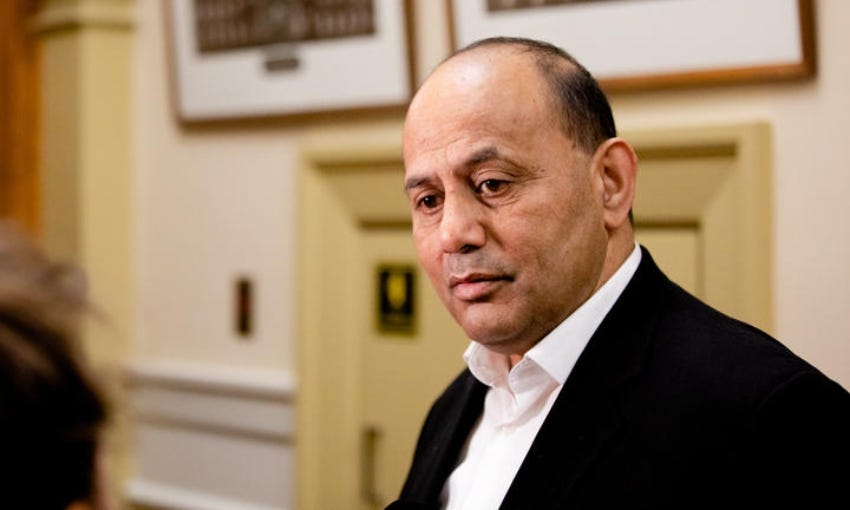Jackson announces consultation on He Puapua, UNDRIP
The two stage process will speak to iwi and Māori organisations first, followed by the wider public
Good morning and welcome to The Bulletin for Friday 2 July, by Alex Braae for The Spinoff. Presented in partnership with Z Energy.
In today’s edition: Jackson announces consultation on He Puapua, Oranga Tamariki facility shut down after damning video, and iwi concerned Kawerau mill won’t be cleaned up.
Image: Māori economic development minister Willie Jackson (Radio NZ, Dom Thomas)
He Puapua is not government policy, but aspects of it could become so after a consultation period. That was the message given by Māori Economic Development minister Willie Jackson yesterday, in launching a two-stage consultation process around implementing the UN Declaration on the Rights of Indigenous People. As Stuff reports, NZ signed up to this in 2010, and since then governments have been trying to figure out how to integrate the ideas of UNDRIP into law. Over the course of this year, the otherwise pretty obscure He Puapua report has been dug out and brought to prominence by Act and National, who say it has secretly been government policy all along, and that it will create an ethnically separatist society.
As was explained by the author of He Puapua, the purpose of the report was to explore ideas about how UNDRIP could be implemented. For an understanding of where He Puapua is meant to be coming from, I recommend listening to this episode of The Detail interviewing constitutional scholar Dr Claire Charters. To take one quote, "part of that was: what would engagement look like on this? It certainly was not to say: 'this is what it must look like', but to provide a line of sight about how you might achieve compliance with these rights," said Charters about her report.
In a perhaps optimistic statement, Willie Jackson launched the consultation process with a wish that it would bring the country together in kōrero. The NZ Herald's Michael Neilson had a brilliantly comprehensive report on the launch event at Ngā Whare Waatea marae in Auckland. The consultation will first involve a targeted engagement with iwi and Māori organisations, with a second stage involving the general public. I said optimistic at the start of the paragraph, because the response from opposition leader Judith Collins was to say "by making this a matter for Māori alone, he is fostering more division." It was a typically frustrating moment for this issue, because her wider point – that discussions need to take place between groups outside of those represented by Māori and the Crown – is reasonable, but the way Collins expressed it was not an accurate reflection of what is actually happening.
The government hasn't exactly helped avoid controversy here though. A particular incident of this came up recently, in which mixed messages came out about whether it was good that He Puapua sat on the shelf over the last term. Jackson had said he was pleased it never made it to a cabinet that included Winston Peters, after the PM had denied a claim from Peters that it was deliberately withheld. That followed another incident in which Ardern said He Puapua wasn't previously released "because of a concern that it would be misconstrued as government policy."
An Oranga Tamariki care and residence facility has been closed following a damning video depicting mistreatment of children. All staff at the facility have been stood down and placed under investigation, after the initial report from Newsroom. The video showed two particular instances, one involving a child being thrown to the ground, and another involving a child being placed in a headlock. It came to light from a whistleblower who filmed the mistreatment captured by CCTV cameras, who then took it to media.
The Ngāti Rangitihi iwi are raising concerns that not enough will be done to remediate the land and water after the closure of Kawerau's mill. Te Ao News reports there is no specific "clean-up" clause in the contract between Norske Skog Tasman and BOP Regional Council, but that general obligations to manage environmental effects apply. The mill owners assert they are not in breach of any consents. But you'd have to imagine industrial sites like Tiwai Point – where locals have been left with an enormous amount of contamination – loom large in the thinking of iwi.
Become a member today to help us analyse and uncover the new New Zealand. Click here for more information on how you can support The Spinoff.
A few more stories on water infrastructure: First of all, here's the correct link to Stuff reporter Thomas Coughlan's excellent piece about the tension between central and local government on it all. National's Christopher Luxon spoke to Newstalk ZB last night setting out the opposition's position, particularly noting the sense of unfairness high performing councils might feel at losing control. And on the boundaries of the four entities, there's a strange situation in Marlborough – LDR Chloe Ranford reports the district will be split between two of the four entities, with Blenheim grouped with places as far flung as Gisborne.
Meanwhile in local government, it's getting to that time in the election cycle when incumbents weigh their options. Radio NZ reports Christchurch mayor Lianne Dalziel will not be running again – sadly her husband died last year, and she said she does not want to campaign without him by her side. Several Christchurch councillors are now eyeing up the job. The NZ Herald's Georgina Campbell reports neither Auckland nor Wellington's mayors have given a firm commitment either way yet. And LDR Matthew Rosenberg interviewed Sir Tim Shadbolt last month, who reckons he's got several more terms in him.
The Ministry for Ethnic Communities has officially been launched, in an upgrade that was recommended by the Royal Commission into the March 15 attacks. Stuff reports it will be led by minister Priyanca Radhakrishnan, and helmed by career public servant Mervin Singham as chief executive. He said part of the ministry's job will be to address "services that don't always meet the needs of ethnic people that need to be done in a more flexible way". There has been some criticism of the new ministry, with National spokesperson Melissa Lee writing in the Indian Weekender that it has been set up as a "paper tiger" that won't deliver real engagement.
The government has announced the new public holiday of Matariki will always fall on a Friday, reports our live updates. The exact calendar date will shift according to the maramataka, but it will always be in either June or July. The next thirty years worth of Matariki dates have been released, and can be found in the story.
In Fiji, the Covid outbreak is starting to get really bad, with hundreds of new cases declared yesterday. We've republished an RNZ Pacific report from yesterday, with the figures including two deaths, bringing the total since April to 22. Fiji's top health official Dr James Fong is warning that the current numbers indicate it will get worse in the coming weeks, with the Fiji Village reporting his fears that the big increases are taking place in hard to reach areas of the country.
In further world news, a heatwave that unfortunately people need to be aware of: The West Coast of the US is currently being smashed in a heatwave, with both a harsh drought and fires, reports the Guardian. Further north in Canada, temperatures are getting alarmingly close to 50 celsius, a heat wave that has resulted in several hundred sudden deaths. This is the future with climate change.
Got some feedback about The Bulletin, or anything in the news?
Get in touch with me at thebulletin@thespinoff.co.nz
Right now on The Spinoff: Housing minister Megan Woods responds to a recent Bernard Hickey column about whether young people can have any hope over housing. Leonie Hayden reviews and ranks the true staples of Kiwi cooking – meal companions like Chicken Tonight and Pataks. And Madeleine Chapman assesses the evidence on whether or not Judith Collins is a Karen.
For a feature today, a really well written piece from Australia about the race to prepare for the big one on the NZ West Coast's Alpine Fault. The ABC piece looks at what is considered to be one of the most active fault lines in the world, which – difficult as these things are to predict – is effectively due to rupture. Now scientists are working out how regularly these quakes happen, and what can be done ahead of time. Here's an excerpt:
Along the drive, in the Alpine Fault’s central section, is the small town of Whataroa. From here, it’s a short drive and hike up to the spot where the active fault line pushes to the surface.
Caroline’s research has focused on earth and social sciences and during her honours study, she spent time on the west coast. Caroline said she “always had a hankering” to return and focus not just on the science of the place, but on its people too.
“I was sitting up there in my field area looking out, thinking, my god the power of this place is really inspiring,” Caroline said. “This place has got so much potential energy.
“There are all these tourist vans ... driving up and down the coast and I thought to myself, what are these tourists going to do? Do they even know they’re in a place with this much risk?”
The All Blacks open their season tomorrow, with what is shaping up as a low-key and probably one-sided encounter against Tonga. That's not meant to imply disrespect to the Tongans, but as Stuff reports, the squad will include no fewer than 13 debutants, while the All Blacks are playing close to their strongest available lineup. The problem – as with all sorts of sport at the moment – is Covid, with many European-based players unable to be selected by Tonga due to prohibitive quarantine requirements.
That's it for The Bulletin. If you want to support the work we do at The Spinoff, please check out our membership programme.







